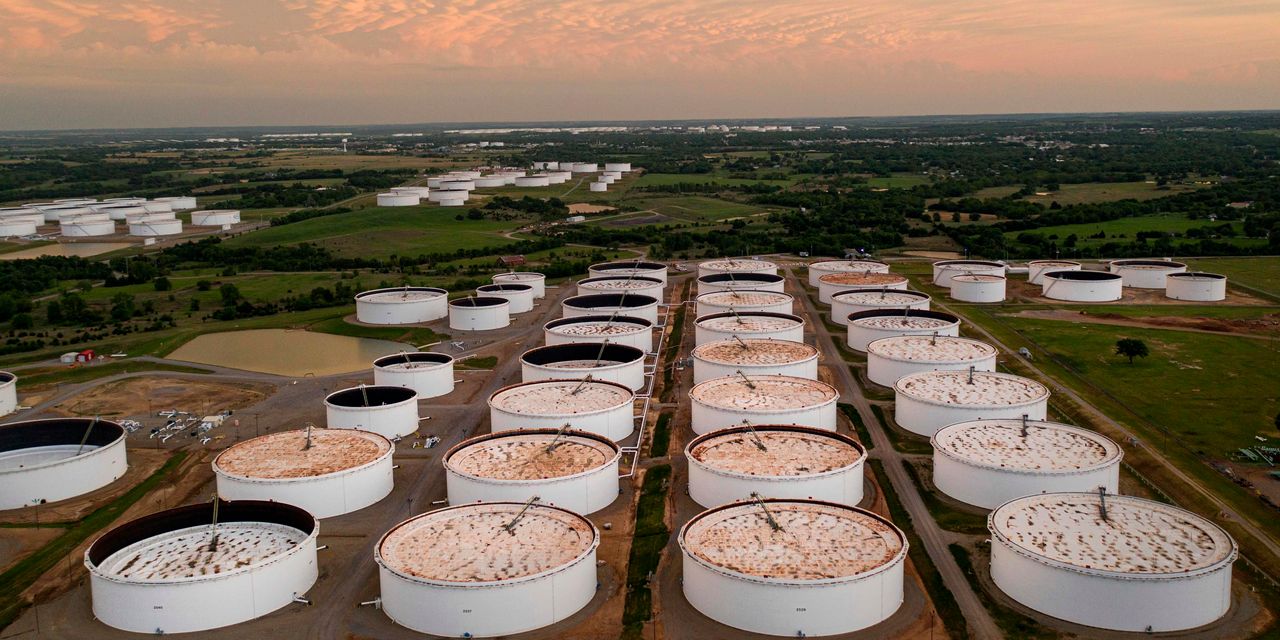Oil futures on Wednesday settled at their highest in over two weeks, with U.S. prices marking their longest streak of daily gains since March after the U.S. government reported a weekly drop in U.S. crude inventories of nearly 11 million barrels.
Traders also awaited news on Hurricane Idalia’s impact on energy operations and demand along the Gulf Coast near Florida, and monitored developments tied to a military coup in Gabon — one of Africa’s largest oil producers and a member of the Organization of the Petroleum Exporting Countries, or OPEC.
Price action
-
West Texas Intermediate crude for October delivery
CL00,
+0.58% CL.1,
+0.58% CLV23,
+0.58%
rose 47 cents, or 0.6%, to settle at $81.63 a barrel on the New York Mercantile Exchange. Prices tallied a fifth straight session climb, the longest since March, according to Dow Jones Market Data. -
October Brent crude
BRNV23
added 37 cents, or 0.4%, at $85.86 a barrel on ICE Futures Europe. The front-month contracts for the global benchmark and WTI settled at their highest since Aug. 14. November Brent
BRN00,
+0.50% BRNX23,
+0.50% ,
the most actively traded contract, gained 33 cents, or 0.4%, to $85.24 a barrel. -
September gasoline
RBU23
added 0.7% to $2.81 a gallon, while September heating oil
HOU23
settled at $3.10 a gallon, down 3.5%. -
October natural gas
NGV23,
-0.14%
tacked on 5% to $2.80 per million British thermal units, prompting prices to turn higher month to date.
Supply data
The Energy Information Administration on Wednesday reported that U.S. commercial crude inventories fell by 10.6 million barrels for the week ending Aug. 25.
That was the third-straight weekly decline reported by the government agency and the largest since the week ended July 28.
On average, analysts polled by S&P Global Commodity Insights expected the report to show a decrease of 5.2 million barrels. The American Petroleum Institute said late Tuesday that U.S. crude inventories fell by 11.5 million barrels last week, according to market sources citing the data.
“Ongoing strength in crude exports and refinery runs have yielded a very sturdy draw to crude inventories,” said said Matt Smith, lead oil analyst, Americas, at Kpler, in emailed commentary.
The EIA report also revealed a supply decline of 200,000 barrels for gasoline, while distillate stockpiles edged up by 1.2 million barrels. Analysts had forecast weekly inventory declines of 600,000 barrels for gasoline and 1.4 million barrels for distillates.
“Refinery issues will work their way into next week’s numbers, while hurricane activity should have little influence, perhaps bolstering product demand” as consumers likely made efforts to front-run Hurricane Idalia in Florida and fill up gas tanks and emergency generators, said Smith.
Crude stocks at the Cushing, Okla., Nymex delivery hub fell by 1.5 million barrels for the week, the EIA said, while stocks in the Strategic Petroleum Reserve rose by 600,000 barrels.
Hurricane Idalia and Gabon coup
Meanwhile, Hurricane Idalia moved across southeastern Georgia Wednesday afternoon after making landfall on Florida’s west coast as a Category 3 storm.
Oil producer Chevron Corp.
CVX,
on Tuesday said it evacuated nonessential personnel from two Gulf of Mexico oil platforms and all personnel from a third as Idalia approached, according to news reports.
Read: Why Hurricane Idalia hasn’t supported U.S. natural-gas prices
“While some oil operations in the Gulf of Mexico saw some action to evacuate some personnel out of an abundance of caution, the track of the storm suggests there may be no measurable impact on refineries or production,” Phil Flynn, senior market analyst at The Price Futures Group, said in a report Wednesday.
In Gabon, there were no signs of disruption to oil production so far, analysts said. Soldiers in the African country said they were overturning the results of a presidential election.
TotalEnergies
TTE,
and Maurel & Prom
MAU,
are among the western oil companies with operations in the country.
“Given that Gabon’s oil production is small, with no particular market, the impact on global oil markets is limited if any,” Anas Alhajji, an independent energy expert and managing partner at Energy Outlook Advisors, said in a Wednesday newsletter.
“The fact that recent cuts by Saudi Arabia and others are voluntary means any reduction in cuts will compensate for Gabon’s oil exports,” he said. “However, the impact will be felt in Israel. Israel now needs to find another supplier.”
Read the full article here













Leave a Reply